Medicare Part D
Since 2006, Medicare beneficiaries have the option of enrolling in a prescription drug benefit, Medicare Part D.
Medicare’s Prescription Drug Benefit
More on Medicare Part D
Select a plan
Medicare Part D beneficiaries must select a private insurer who offers the benefit in the beneficiary’s geographic area. Plans vary as to the medications covered, deductibles, co-pays and premiums charged. Premiums may be deducted from the monthly Social Security payment, like Part B. Beneficiaries who have low income and assets may qualify for “Extra Help,” meaning that the premiums and co-payments are reduced. Persons eligible for Medicaid and Medicare (“dually eligible”) pay the least.
What you need to know about enrollment
A person is eligible to enroll in a Part D plan when he or she qualifies for Medicare. This is usually when someone turns 65, although a person receiving Social Security Disability Income may qualify for benefits at a younger age. Special rules apply for people who qualify for both Medicare and Medicaid.
Although the Part D plan is optional, a person who does not enroll when first eligible and later decides to enroll must pay a surcharge to the premium equal to 1% per month. There is no cap to the penalty.
A person who does not enroll when first eligible does not pay a surcharge, however, if he or she is enrolled in another health care plan that is determined by the federal government to be a “creditable” plan. A “creditable” plan is one that offers prescription benefits similar to the Part D benefits. Examples of creditable plans include federal employee retirement health plans, the military TRICARE, and some private retiree health insurance policies. The plan administrator for a health plan must inform a retiree in writing each year whether the plan is “creditable.” A person should keep the letter as it may be necessary to prove credible coverage.
The 'doughnut hole' and plan differences
A person may choose a plan that is offered in his or her geographic area. The model plan offers to pay 75 percent of the cost of drugs covered by the plan up to the initial coverage limit, less a deductible. There is no benefit paid for expenses after this amount until a “catastrophic” benefit becomes available when annual expenses exceed the out-of-pocket limit. This is what has been described as the “doughnut hole.” Once expenses exceed the out-of-pocket limit, then the plan pays 95 percent of the cost. The deductible, initial coverage limit, and out-of-pocket limit are increased each year by the increase in drug costs. In fact, however, not all plans follow this model. Some offer different deductibles and some do not have a “doughnut hole.”
Some plans are offered through Medicare Health Maintenance Organizations (“HMOs”) or Preferred Provider Organizations (“PPOs”). Some HMOs and PPOs do not charge any additional premium for the prescription drug benefit.
Plan 'formulary'
A plan will only pay a benefit if the drug is covered by the plan. This is called the plan’s formulary. Each plan has a different formulary. The plan may also restrict the number of pills it will cover for a formulary drug, require plan approval before paying for a drug, or require that a less costly drug be used before paying for the prescribed drug. Therefore, it is very important to know whether a particular medication is included in the plan’s formulary. The plan also has the right to change its formulary with 60 days notice to the beneficiary.
Switching plans
In most cases, a person can change plans only once a year during the “open season” which occurs between November 15 and December 31. Each year, this period should be used to assess how your previous plan has performed for your individual circumstances, and to shop for other plans that may better meet your needs.
'Extra help'
Individuals with limited income and assets may qualify for Medicare Part D subsidies. The income and resource levels are issued by the federal government and revised annually. Dually eligible beneficiaries (Medicare and Medicaid) who are in a nursing home will not have to pay anything and can switch plans once a month. Application for “Extra Help” is made either through the federal Social Security Administration or the state agency responsible for administering the Medical Assistance program
Appeals
A person may have rights to file appeals if he or she is adversely affected by a provider’s decision. These rights may include: change in formulary of a needed drug, change in prescription to a drug not on the formulary, limitations on quantity of drugs or access to drugs.
Where to go for help
The Center for Medicare and Medicaid Services (“CMS”) web site, www.medicare.gov., offers information about Part D. It also contains a listing of all the available plans for a particular state on its web site and a tool kit to help select a particular plan. Medicare can be reached toll-free at 800-633-4227. Area Agencies on Aging, which are found in every local jurisdiction, also provide excellent information about Part D as well as other questions about Medicare. These agencies are listed in the telephone book or internet directories.
Role of the Elder Law Attorney
This information is provided as a public service and is not intended as legal advice. Such advice should be obtained from a qualified Elder and Special Needs Law attorney.
Contact the experienced Elder Law Attorneys at R. F. Meyer & Associates for legal advice concerning your specific situation
Arrange a free 15-minute phone consultation
Fill out the form below and a representative from R. F. Meyer & Associates will get back in touch shortly, to schedule your free call. The brief consultation should allow us to frame the issues, and for us to to provide a price estimate for any recommended legal work.
